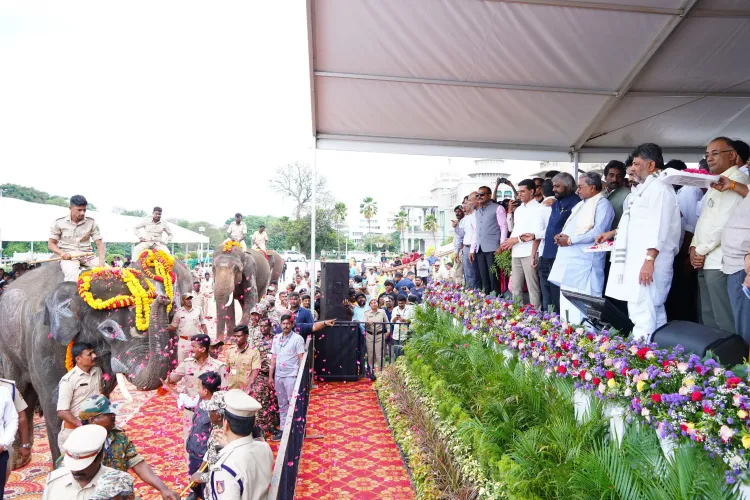Why Did Karnataka Transfer Four Trained Kumki Elephants to Andhra Pradesh?

Synopsis
Key Takeaways
- Four Kumki elephants were transferred from Karnataka to Andhra Pradesh.
- Karnataka aims to mitigate human-elephant conflicts.
- Pawan Kalyan assured personal oversight of the elephants' care.
- The transfer is part of a broader cooperation between the two states.
- Karnataka is open to providing more elephants in the future.
Amaravati/Bengaluru, May 21 (NationPress) The Karnataka government on Wednesday transferred four Kumki elephants to Andhra Pradesh to address human-elephant conflicts in various regions of the state.
Deputy Chief Minister Pawan Kalyan, who also oversees the forests and environment department, accepted the specially-trained elephants during a ceremony in Bengaluru.
Karnataka Chief Minister Siddaramaiah, Deputy Chief Minister D.K. Shivakumar, and Forest Minister Eshwar B. Khandre officially handed over the elephants to officials from Andhra Pradesh's forest department.
Karnataka has committed to providing a total of six Kumki elephants to Andhra Pradesh. Unfortunately, two elephants could not be transferred on Wednesday due to health issues and incomplete training. They are scheduled to be delivered at a later date.
Along with the elephants, various agreements concerning the Kumki elephants, licenses, protective guidelines, and additional documents were also provided to the Andhra Pradesh forest officials.
After conducting the sacred Gaja Puja, the Karnataka leaders bid farewell to the Kumki elephants by waving a flag, while Pawan Kalyan welcomed the tuskers with a shower of flowers.
The Kumki elephants named Deva, Krishna, Abhimanyu, and Mahendra were officially handed over to Andhra Pradesh.
The Mahouts from Karnataka will accompany the Kumki elephants for two months to train the Mahouts from Andhra Pradesh on their care and management.
During the event, Chief Minister Siddaramaiah expressed Karnataka's willingness to provide additional elephants to Andhra Pradesh as needed.
Pawan Kalyan assured that he would oversee the health and care of the Kumki elephants transferred to his state, emphasizing the importance of maintaining friendly relations between the two states.
Last August, Karnataka's forest department agreed to provide trained Kumki elephants at the request of Andhra Pradesh, aimed at alleviating the destruction caused by wild elephants, which have been damaging crops and endangering lives.
This agreement was made during a meeting between Pawan Kalyan and Eshwar Khandre in Bangalore.
Pawan Kalyan informed the media that both states have concurred to collaborate on forest protection, wildlife conservation, and the safeguarding of red sander resources. They discussed seven crucial points and reached a memorandum of understanding.
Furthermore, Chief Minister Siddaramaiah highlighted the necessity of cooperation among neighboring states to mitigate human-elephant conflicts.
"Our state boasts the highest elephant population in India, totaling 3,695 elephants," stated CM Siddaramaiah.
"By preventing human-elephant conflicts, we can safeguard lives and protect crops. With this key goal in mind, six Kumki elephants are being transferred from Karnataka to Andhra Pradesh," he added.
Kumki elephants are trained captive elephants found in South India, particularly in Karnataka, Tamil Nadu, and Kerala, utilized for managing and controlling wild elephants. They are commonly employed by forest departments for various operations.
CM Siddaramaiah noted: "Today, we are transferring elephants to Andhra Pradesh. We are set to provide six Kumki elephants; four are being handed over today, with the remaining two to follow later."
"These elephants are both tamed and trained. We have also arranged for a month-long training for the Mahouts from Andhra Pradesh, as effective training is vital for managing human-animal conflicts. Training is essential for both Mahouts and elephants," he concluded.









